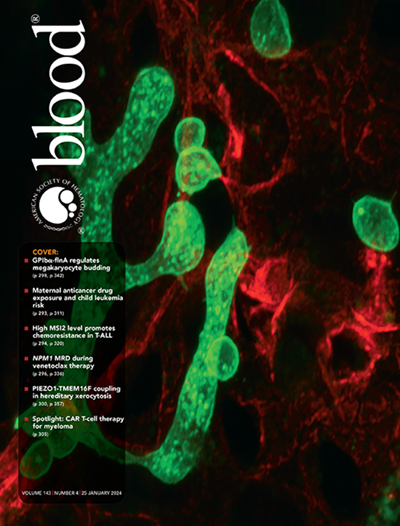骨髓B细胞单细胞图谱揭示了免疫性血小板减少症患者中枢B细胞耐受缺陷。
IF 23.1
1区 医学
Q1 HEMATOLOGY
引用次数: 0
摘要
免疫性血小板减少症(ITP)的特点是抗血小板自身抗体的过量产生。虽然B细胞耗竭疗法在ITP中显示出希望,但其高复发率表明,在B细胞发育的早期阶段,耐受性可能会重新破坏。在这里,我们研究了中枢b细胞耐受机制如何影响ITP中自身抗体的产生。配对单细胞RNA/B细胞受体(BCR)测序和批量BCR测序显示,ITP患者骨髓和外周B细胞中免疫球蛋白κ链(IGK)基因的V-J基因组距离减少,未成熟B细胞中重组激活基因(RAG)表达减少,提示受体编辑不足。单细胞抗体克隆显示ITP中自身反应性和多反应性naïve B细胞增加,表明中枢B细胞耐受缺陷。通过体内研究,我们建立了受体编辑缺陷与抗血小板抗体产生之间的因果关系,验证了未成熟B细胞阶段是失调的关键阶段。这些发现表明,未成熟B细胞的受体编辑不足会引发ITP中枢性B细胞耐受性缺陷和自身抗体积累。本文章由计算机程序翻译,如有差异,请以英文原文为准。
The single-cell atlas of bone marrow B cells reveals defective central B-cell tolerance in immune thrombocytopenia.
Immune thrombocytopenia (ITP) is characterized by overproduction of anti-platelet autoantibodies. While B-cell depletion therapies show promise in ITP, their high relapse rates suggest a potential de novo breakdown of tolerance during an early stage of B cell development. Here, we investigated how central B-cell tolerance mechanisms affect autoantibody production in ITP. Paired single-cell RNA/B cell receptor (BCR) sequencing and bulk BCR sequencing revealed reduced V-J genomic distances in immunoglobulin kappa-chain (IGK) genes within bone marrow and peripheral B cells from ITP patients, along with decreased expression of recombination activating gene (RAG) in the immature B cells, suggesting insufficient receptor editing. Single-cell antibody cloning demonstrated increased autoreactive and polyreactive naïve B cells in ITP, indicating defective central B-cell tolerance. Through in vivo study, we established a causal link between receptor editing defects and anti-platelet antibody production, validating the immature B cell stage as the key phase of dysregulation. These findings suggest that insufficient receptor editing of immature B cells triggers central B-cell tolerance deficiency and autoantibody accumulation in ITP.
求助全文
通过发布文献求助,成功后即可免费获取论文全文。
去求助
来源期刊

Blood
医学-血液学
CiteScore
23.60
自引率
3.90%
发文量
955
审稿时长
1 months
期刊介绍:
Blood, the official journal of the American Society of Hematology, published online and in print, provides an international forum for the publication of original articles describing basic laboratory, translational, and clinical investigations in hematology. Primary research articles will be published under the following scientific categories: Clinical Trials and Observations; Gene Therapy; Hematopoiesis and Stem Cells; Immunobiology and Immunotherapy scope; Myeloid Neoplasia; Lymphoid Neoplasia; Phagocytes, Granulocytes and Myelopoiesis; Platelets and Thrombopoiesis; Red Cells, Iron and Erythropoiesis; Thrombosis and Hemostasis; Transfusion Medicine; Transplantation; and Vascular Biology. Papers can be listed under more than one category as appropriate.
 求助内容:
求助内容: 应助结果提醒方式:
应助结果提醒方式:


